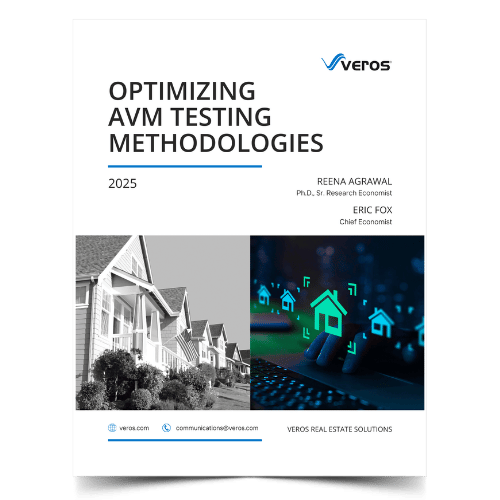In a real estate market that constantly changes, accurate property valuations are of the utmost importance. Automated Valuation Models (AVMs) have emerged as powerful tools, providing quick and data-driven estimates for property values. Nevertheless, value estimates can vary significantly, which is where confidence scores come into play. These scores are a vital tool to show the reliability of a lender grade AVM’s estimate, enabling housing finance stakeholders – such as lenders and investors – a clearer understanding of the risks and opportunities that come with a property.
Understanding the Confidence Score
The confidence score in an AVM, such as VeroVALUE, serves as a numerical representation of the expected reliability and accuracy of the valuation produced by the model. This score generally ranges from 0 to 100, where higher values indicate increased confidence in the AVM results. Several factors contribute to determining the confidence score, including:
1. Data Quality
The quality, currency, and comprehensiveness of the data utilized in the model play a crucial role in shaping the confidence score. When high-quality data is incorporated, it results in more dependable valuations. This not only enhances the model’s predictive accuracy but also builds trust among users, as they can rely on the valuations for critical decisions. Moreover, robust data sets enable the AVM to adapt to market trends more effectively, further improving its overall performance.
2. Model Calibration
The algorithms used in the AVM need to be accurately calibrated according to historical data and prevailing market conditions. Models that are well-calibrated tend to produce higher confidence scores. Proper calibration allows the algorithms to better capture the nuances of the market, ensuring that they respond effectively to shifts in trends and patterns. This adaptability not only enhances valuation accuracy but also increases stakeholder confidence in the model’s outputs, making it a more valuable tool in the real estate landscape.
3. Comparative Analysis
An AVM might evaluate its output by comparing it to similar properties or earlier valuations to determine its reliability. This comparative analysis helps identify any discrepancies and assess the model’s performance against established benchmarks. By continually refining its approach based on these comparisons, the AVM can enhance its accuracy and provide users with more trustworthy valuations over time.
Over the years, some lenders have adopted the use of Forecast Standard Deviation (FSD) as a form of Confidence Score. While FSD is not perfect, it does provide a certain level of predictability. FSD is a statistical measure that indicates the likelihood that an AVM estimate falls within a specific range of the actual market value, typically measured against the sales price. A lower FSD percentage suggests a higher probability that the AVM’s estimated value is accurate. Most AVM providers today provide their own confidence score and also an FSD on each AVM report.
Veros Confidence Score Explained
The Veros Confidence Score (VCS) is widely recognized as one of the most accurate and reliable in the industry, providing exceptional accuracy in assessing VeroVALUE AVM results. Eric Fox, Chief Economist at Veros explains, “The Veros Confidence Score is a critical tool that empowers our clients to make data-driven decisions with unparalleled precision. By aligning the VCS with the accuracy of the VeroVALUE AVM, we’re able to provide greater transparency and confidence in property valuations.” This alignment is key in helping customers identify the most reliable property valuations based on their specific needs and risk tolerance.
The VCS ranges from 75 to 100, with 100 indicating the highest confidence in the accuracy of a property valuation. As the VCS increases, the percentage of VeroVALUE estimates that fall within +/- 10% of the actual value (P10) increases as well, providing users with more reliable estimates. Users can also set thresholds for our AVM they’re willing to accept, such as only using values with a VCS of 85 or higher.
VeroVALUE Preferred (VVP) automatically uses only estimates with a VCS of 90 or greater, which leads to higher accuracy. For example, the regular VeroVALUE has a P10 of 90% and a hit rate of 93% while VVP has a higher P10 of 95% but a slightly lower hit rate of 87%. This trade-off occurs because VVP filters out the potentially less accurate VCS values, which can only be done because the VCS is highly correlated to accuracy in valuations. The VCS empowers users to tailor their property valuation criteria to meet their specific needs, ensuring trustworthy and accurate data.
Conclusion
In conclusion, confidence scores play a critical role in the landscape of AVMs offering insights into the reliability of AVM estimates. As we have explored, these scores are influenced by a multitude of factors, including data quality, model calibration, and comparative analysis. Each of these elements contributes to the overall accuracy and trustworthiness of an AVMs output, guiding stakeholders in their decision-making process. With that being said, confidence scores should be clearly defined and tested to ensure they accurately reflect the reliability of the AVM’s valuation, thereby providing the necessary trust and transparency for their use in environments where high-stakes decisions are made.
Specifically, Veros’ confidence score within its VeroVALUE AVM exemplifies how a robust framework can enhance the valuation process. By providing a clear numerical representation of valuation reliability, Veros empowers lenders and investors to navigate the complexities of the real estate market with greater assurance. As the market continues to evolve, the importance of these confidence scores cannot be overstated – they serve not only as indicators of precision but also as vital tools for risk assessment and opportunity identification.
A deeper understanding of confidence scores, particularly those associated with AVMs like VeroVALUE, equips real estate professionals with the insights needed to make informed decisions in an ever-evolving market. Embracing these tools will undoubtedly lead to more effective valuation practices and, by extension, a more stable and trustworthy real estate market.
Want to learn more about how Veros’ Confidence Score can improve your property valuation process? Get in touch with us to discover the VeroVALUE AVM difference, and how it, along with our confidence score can streamline your decision-making with clarity and trust.







